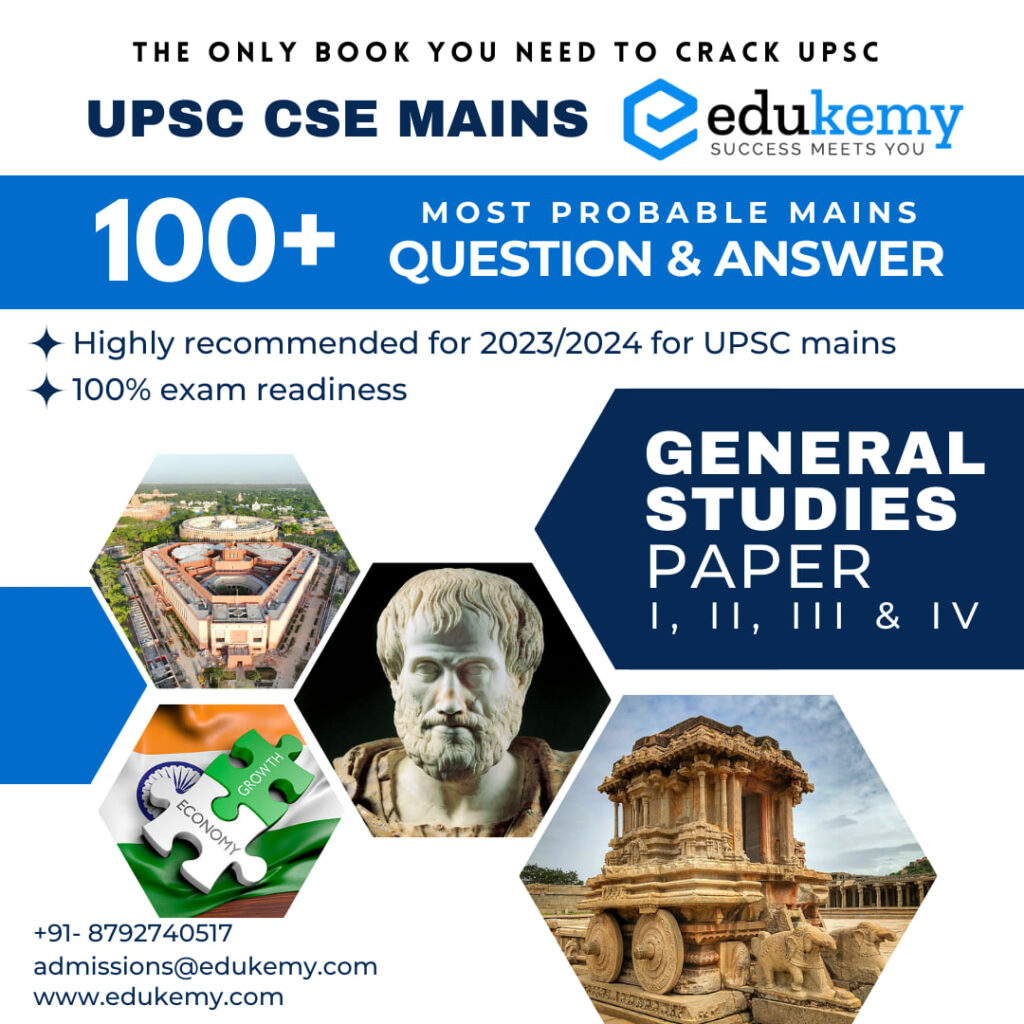

The UPSC (Union Public Service Commission) Main Examination is a rigorous and comprehensive assessment that plays a pivotal role in selecting candidates for various prestigious civil services in India. The Political Science and International Relations (PSIR) optional paper in the UPSC Mains examination is particularly significant, testing candidates’ understanding of political theories, governance structures, and global affairs. The UPSC Mains 2019 PSIR Optional Previous Year Paper serves as a valuable resource for aspirants preparing for the exam, offering insights into the examination pattern, question trends, and the depth of knowledge required. Analyzing and mastering this paper is crucial for candidates aiming to excel in the PSIR optional subject and, by extension, enhance their overall performance in the UPSC Main Examination.
Contents
- 1 Paper – 1
- 2 Paper – 2
- 3 Frequently Asked Questions (FAQs)
Paper – 1
Section – A
1. Comment on the following in about 150 words each: 10×5=50 marks
- (a) Resurgence of political theory. 10 marks
- (b) Pluralist theory of the State.10 marks
- (c) End of Ideology debate.10 marks
- (d) Deliberative democracy. 10 marks
- (e) M. K. Gandhi’s concept of Swaraj.10 marks
2.
- (a)Explain Aristotle’s critique of Plato’s Idealism. 20 marks
- (b) Examine communitarian perspectives on justice. 15 marks
- (c) Compare negative and positive concepts of liberty. 15 marks
3.
- (a) According to Gramsci, ‘hegemony is primarily based on the organization of consent.’ Comment. 20 marks
- (b) Discuss Kautilya’s views on the elements of the State.15 marks
- (c) Distinguish between liberal feminism and radical feminism. 15 marks
4.
- (a) Critically examine Hannah Arendt’s conceptual triad of labour, work and action. 20 marks
- (b) Discuss the doctrine of ‘rights as trumps’. 15 marks
- (c) What is the contemporary relevance of Marxism? 15 marks
Section – B
5. Comment on the following in about 150 words each: 50×5=50 marks
- (a) Unity and integrity of India was perhaps the single uppermost factor in the minds of the Constitution makers. Comment. 10
- (b) Dalit perspective on Indian national movement. Discuss.
- (c) Despite constitutional mandate the Inter-State Council has not come of age. Discuss.
- (d) Political decentralization has not been matched by administrative decentralization at the grassroots level. Explain
- (e) Write short note on the significance of the Chipko Movement.
6.
- (a) National movement in India was anti-imperialist and increasingly radical in its socio-economic and political programs. Discuss.
- (b) What has been the political fallout of the Green Revolution in India? Explain.
- (c) The changing socio-economic profile of our legislators does not augur well for the health of Indian democracy. Comment.
7.
- (a) Development has overshadowed the influence of caste in electoral behaviour in recent elections. Discuss.
- (b) The Comptroller and Auditor-General of India enhances the accountability of the Government and serves as the watchdog of the finances of the Government. Explain.
- (c) Discuss, in brief, the role of the National Commission for women. Do you think it is a toothless organization?
8.
- (a) “The basic structure doctrine is implicit in the Indian Constitution; the Supreme Court has only given it an explicit form.” Comment.
- (b) Prime Minister’s Office (PMO) has emerged as the most powerful institution in India. Discuss.
- (c) Comment on the relevance of the Directive Principles of State Policy in an era of liberalization and globalization
Paper – 2
Section – A
Q1. Answer the following questions in about 150 words each: 10×5=50 marks
- (a) Discuss the utility of Nuclear Deterrence Theory in the context of the recent standoff between India and Pakistan. 10 marks
- (b) Write a brief note on the 17th NAM Summit in Venezuela. 10 marks
- (c) In what way does the predominance of the USA in the UN funding affect its decision-making? 10 marks
- (d) Evaluate the role of BIMSTEC in multi-sectoral technical and economic cooperation. 10 marks
- (e) Do you think that sustainable development goals are really attainable by 2030? 10 marks
Q2.
- (a) Examine the significance of the comparative method in political analysis. Discuss its limitations. 20 marks
- (b) Explain the reasons for low voter turnout in democratic countries with suitable examples. 15 marks
- (c) Evaluate the role of the International Court of Justice in inter-State disputes. 15 marks
Q3.
- (a) Explain the relevance of the Marxist approach in the context of globalization. 20 marks
- (b) Identify the benefits of a multi-polar world. 15 marks
- (c) Discuss the importance of personal data protection in the context of human rights. 15 marks
Q4.
- (a) How are the rising powers challenging the USA and Western dominance in the IMF and the World Bank? 20 marks
- (b) Write an essay on ‘New Social Movements in developing countries.15 marks
- (c) Is democracy promotion in developing countries a feasible idea? 15 marks
Section – B
Q5. Answer the following questions in about 150 words each: 10×5=50 marks
- (a) Examine the role of ‘parliamentary diplomacy’ in India’s foreign policy. 10 marks
- (b) Compare and contrast Non-alignment 1.0 with Non-alignment 2.0. 10 marks
- (c) How is India pursuing her foreign policy objectives through the IBSA Dialogue Forum (India, Brazil and South Africa)? 10 marks
- (d) How is India responding to the idea of Indo-Pacific?10 marks
- (e) “The growing closeness between India and Israel will strengthen the cause of Palestine.” Comment. 10 marks
Q6.
- (a) Describe briefly China’s ‘One Belt One Road (OBOR)’ Initiative and analyze India’s major concerns. 20 marks
- (b) What are the current issues in Brahmaputra River water sharing between India and China? 15 marks
- (c) Analyze the recent trends in India’s role in the UN peacekeeping operations. 15 marks
Q7.
- (a) Examine the increasing significance of maritime security in India’s foreign policy. 20 marks
- (b) Write a brief note on India’s interests in West Asia. 15 marks
- (c) How is the current standoff between the USA and Iran affecting India’s energy security? 15 marks
Q8.
- (a) Evaluate India’s vision of a new world order. 20 marks
- (b) Critically examine India’s position on South China Sea Dispute. 15 marks
- (c) Given the recent developments in the region, do you think that there is a need to change India’s ‘No First Use (NFU)’ nuclear policy?15 marks
Frequently Asked Questions (FAQs)
Q: How important is conceptual clarity in the PSIR optional paper?
A: Conceptual clarity is crucial in the PSIR optional paper. UPSC tends to focus on candidates’ understanding of political theories, international relations concepts, and their ability to apply these to real-world scenarios. A clear and precise expression of ideas is highly valued.
Q: How can one effectively manage time while answering PSIR optional questions in UPSC Mains?
A: Time management is key in the PSIR optional paper. Candidates should allocate time wisely, giving sufficient time to each question based on its marks weightage. It’s advisable to begin with questions you are most confident about to secure those marks and then move on to more challenging ones.
Q: Are contemporary issues important in the PSIR optional paper, or should the focus be on traditional topics?
A: The PSIR optional paper usually includes a mix of questions covering both traditional and contemporary topics. Candidates should be well-versed in classical political theories and international relations concepts while also staying updated on current affairs and their implications for political and international dynamics.
In case you still have your doubts, contact us on 9811333901.
For UPSC Prelims Resources, Click here
For Daily Updates and Study Material:
Join our Telegram Channel – Edukemy for IAS
- 1. Learn through Videos – here
- 2. Be Exam Ready by Practicing Daily MCQs – here
- 3. Daily Newsletter – Get all your Current Affairs Covered – here
- 4. Mains Answer Writing Practice – here
Visit our YouTube Channel – here

